
Edward H. Kennedy
@edwardhkennedy.bsky.social
assoc prof of statistics & data science at Carnegie Mellon
https://www.ehkennedy.com/
interested in causality, machine learning, nonparametrics, public policy, etc
https://www.ehkennedy.com/
interested in causality, machine learning, nonparametrics, public policy, etc
Pinned
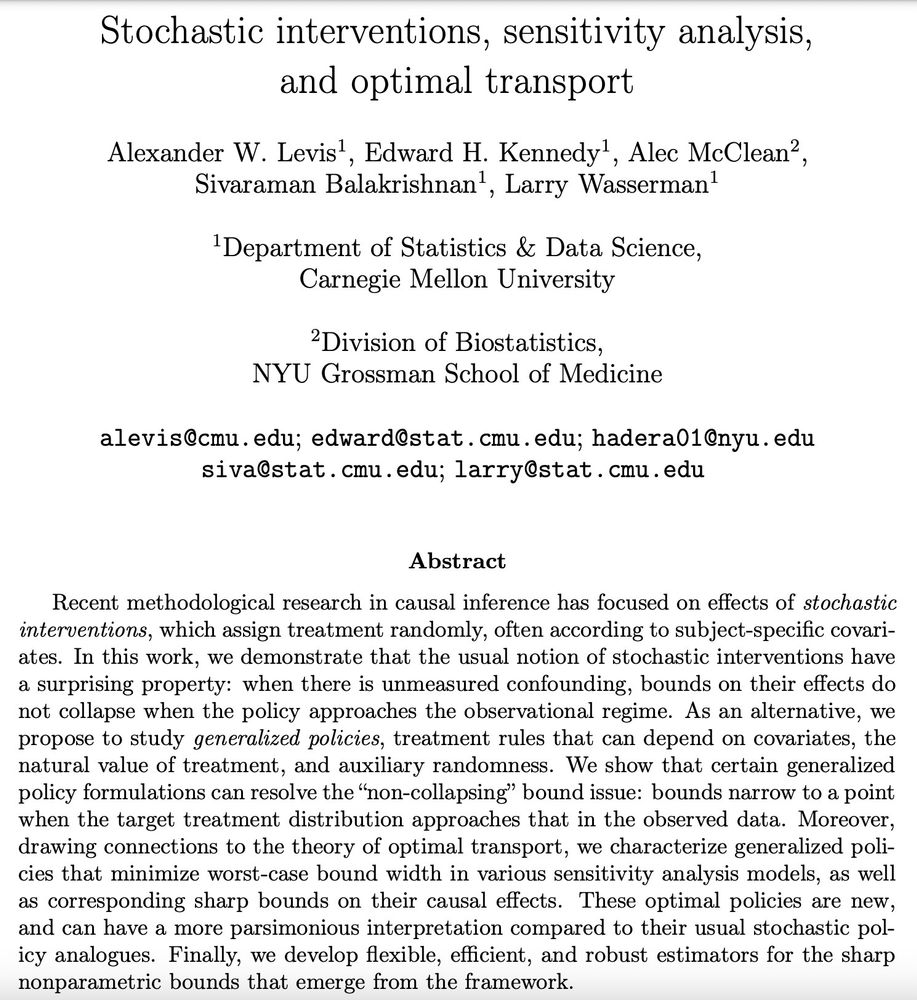
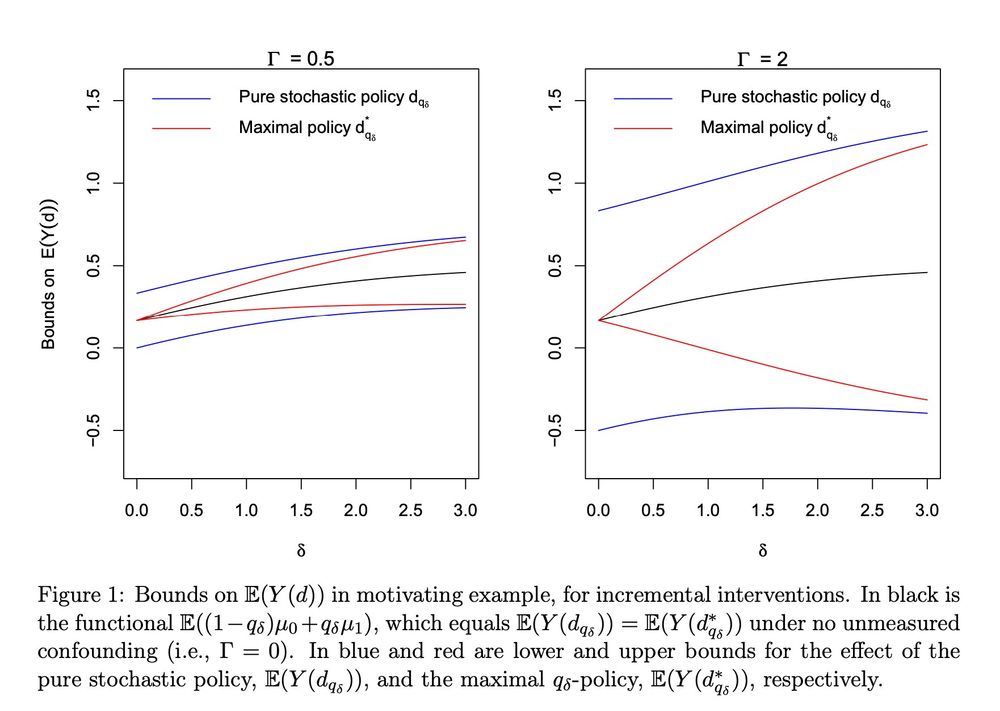
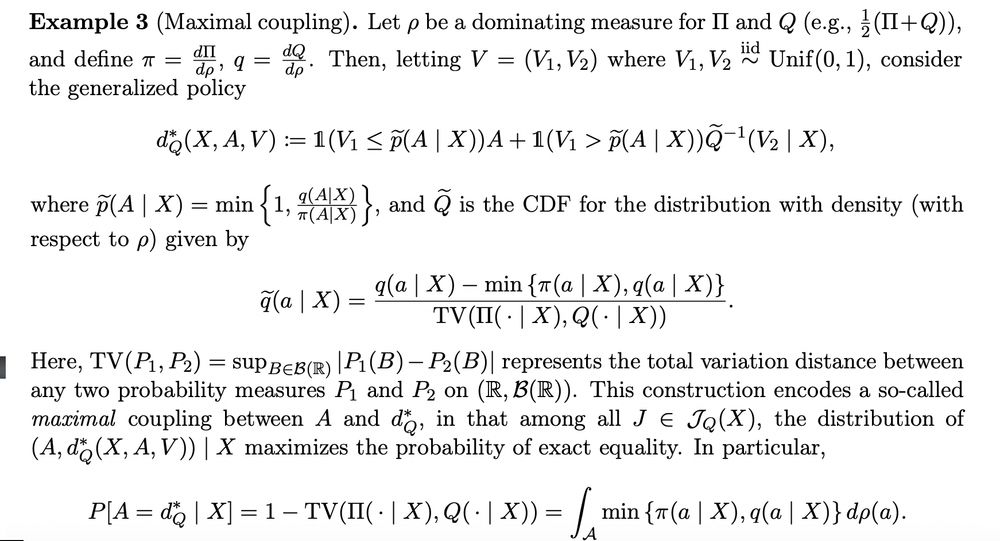
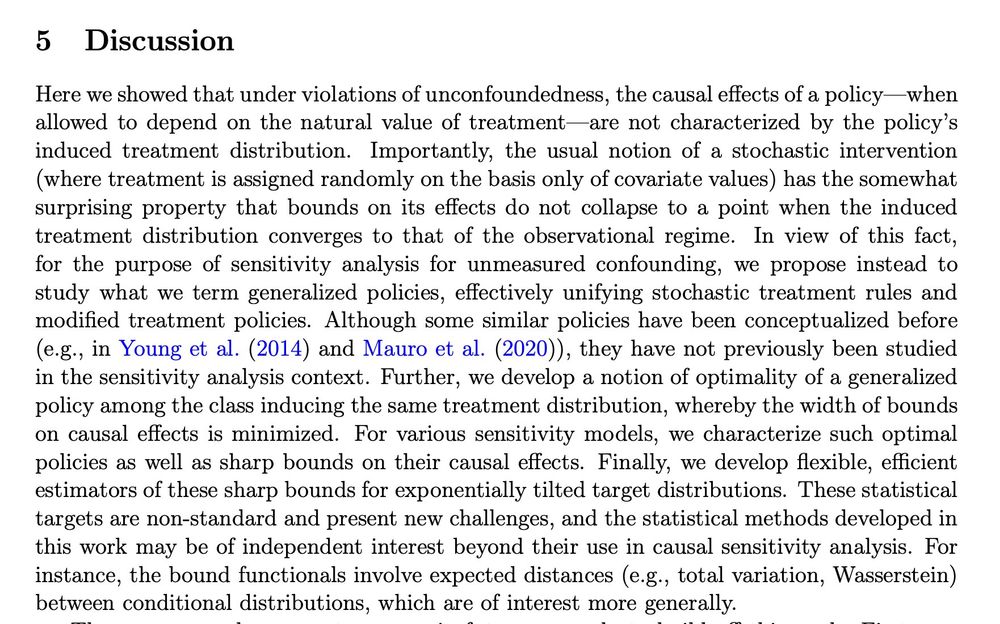
New paper! arxiv.org/pdf/2411.14285
Led by amazing postdoc Alex Levis: www.awlevis.com/about/
We show causal effects of new "soft" interventions are less sensitive to unmeasured confounding
& study which effects are *least* sensitive to confounding -> makes new connections to optimal transport
Led by amazing postdoc Alex Levis: www.awlevis.com/about/
We show causal effects of new "soft" interventions are less sensitive to unmeasured confounding
& study which effects are *least* sensitive to confounding -> makes new connections to optimal transport
Reposted by Edward H. Kennedy
Went to look up textbook results after getting the nagging feeling that an ML paper was reinventing classical ideas, and found this gem:
"Not reading to the end of Le Cam's papers became not uncommon in later years. His ideas have been regularly rediscovered."
At least they're in good company.
"Not reading to the end of Le Cam's papers became not uncommon in later years. His ideas have been regularly rediscovered."
At least they're in good company.

March 28, 2025 at 11:37 PM
Went to look up textbook results after getting the nagging feeling that an ML paper was reinventing classical ideas, and found this gem:
"Not reading to the end of Le Cam's papers became not uncommon in later years. His ideas have been regularly rediscovered."
At least they're in good company.
"Not reading to the end of Le Cam's papers became not uncommon in later years. His ideas have been regularly rediscovered."
At least they're in good company.
Reposted by Edward H. Kennedy
From twitter:
A short thread:
It amazes me how many crucial ideas underlying now-popular semiparametrics (aka doubly robust parameter/functional estimation / TMLE / double/debiased/orthogonal ML etc etc) were first proposed many decades ago.
I think this is widely under-appreciated!
A short thread:
It amazes me how many crucial ideas underlying now-popular semiparametrics (aka doubly robust parameter/functional estimation / TMLE / double/debiased/orthogonal ML etc etc) were first proposed many decades ago.
I think this is widely under-appreciated!
September 30, 2024 at 3:11 AM
From twitter:
A short thread:
It amazes me how many crucial ideas underlying now-popular semiparametrics (aka doubly robust parameter/functional estimation / TMLE / double/debiased/orthogonal ML etc etc) were first proposed many decades ago.
I think this is widely under-appreciated!
A short thread:
It amazes me how many crucial ideas underlying now-popular semiparametrics (aka doubly robust parameter/functional estimation / TMLE / double/debiased/orthogonal ML etc etc) were first proposed many decades ago.
I think this is widely under-appreciated!
"Randomized trials should be used to answer any causal question that can be so studied...
But the reality is that observational methods are used everyday to answer pressing causal questions that cannot be studied in randomized trials."
- Jamie Robins, 2002
tinyurl.com/4yuxfxes
tinyurl.com/zncp39mr
But the reality is that observational methods are used everyday to answer pressing causal questions that cannot be studied in randomized trials."
- Jamie Robins, 2002
tinyurl.com/4yuxfxes
tinyurl.com/zncp39mr


January 13, 2025 at 2:49 AM
"Randomized trials should be used to answer any causal question that can be so studied...
But the reality is that observational methods are used everyday to answer pressing causal questions that cannot be studied in randomized trials."
- Jamie Robins, 2002
tinyurl.com/4yuxfxes
tinyurl.com/zncp39mr
But the reality is that observational methods are used everyday to answer pressing causal questions that cannot be studied in randomized trials."
- Jamie Robins, 2002
tinyurl.com/4yuxfxes
tinyurl.com/zncp39mr
Reposted by Edward H. Kennedy
What's the best paper you read this year?
December 27, 2024 at 5:02 PM
What's the best paper you read this year?
Reposted by Edward H. Kennedy
Thank you Alec for leading this project, I learned a lot! This paper has a very useful study of what contrasts are feasible in situations with many treatments and positivity violations, including necessary assumptions and efficient one-step estimators. Check it out!
New-ish paper alert! arxiv.org/abs/2410.13522
We tackle the challenge of comparing multiple treatments when some subjects have zero prob. of receiving certain treatments. Eg, provider profiling: comparing hospitals (the “treatments”) for patient outcomes. Positivity violations are everywhere.
We tackle the challenge of comparing multiple treatments when some subjects have zero prob. of receiving certain treatments. Eg, provider profiling: comparing hospitals (the “treatments”) for patient outcomes. Positivity violations are everywhere.

Fair comparisons of causal parameters with many treatments and positivity violations
Comparing outcomes across treatments is essential in medicine and public policy. To do so, researchers typically estimate a set of parameters, possibly counterfactual, with each targeting a different ...
arxiv.org
December 13, 2024 at 11:53 PM
Thank you Alec for leading this project, I learned a lot! This paper has a very useful study of what contrasts are feasible in situations with many treatments and positivity violations, including necessary assumptions and efficient one-step estimators. Check it out!
Reposted by Edward H. Kennedy
New-ish paper alert! arxiv.org/abs/2410.13522
We tackle the challenge of comparing multiple treatments when some subjects have zero prob. of receiving certain treatments. Eg, provider profiling: comparing hospitals (the “treatments”) for patient outcomes. Positivity violations are everywhere.
We tackle the challenge of comparing multiple treatments when some subjects have zero prob. of receiving certain treatments. Eg, provider profiling: comparing hospitals (the “treatments”) for patient outcomes. Positivity violations are everywhere.

Fair comparisons of causal parameters with many treatments and positivity violations
Comparing outcomes across treatments is essential in medicine and public policy. To do so, researchers typically estimate a set of parameters, possibly counterfactual, with each targeting a different ...
arxiv.org
December 13, 2024 at 11:17 PM
New-ish paper alert! arxiv.org/abs/2410.13522
We tackle the challenge of comparing multiple treatments when some subjects have zero prob. of receiving certain treatments. Eg, provider profiling: comparing hospitals (the “treatments”) for patient outcomes. Positivity violations are everywhere.
We tackle the challenge of comparing multiple treatments when some subjects have zero prob. of receiving certain treatments. Eg, provider profiling: comparing hospitals (the “treatments”) for patient outcomes. Positivity violations are everywhere.
Reposted by Edward H. Kennedy
Found slides by Ankur Moitra (presented at a TCS For All event) on "How to do theoretical research." Full of great advice!
My favourite: "Find the easiest problem you can't solve. The more embarrassing, the better!"
Slides: drive.google.com/file/d/15VaT...
TCS For all: sigact.org/tcsforall/
My favourite: "Find the easiest problem you can't solve. The more embarrassing, the better!"
Slides: drive.google.com/file/d/15VaT...
TCS For all: sigact.org/tcsforall/
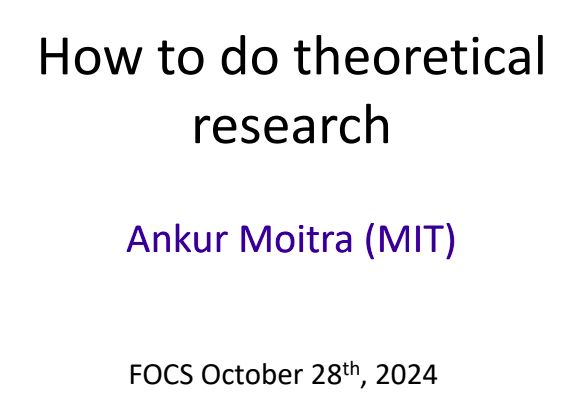
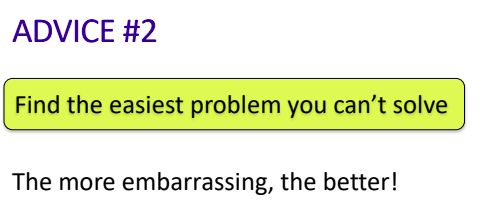
December 13, 2024 at 8:31 PM
Found slides by Ankur Moitra (presented at a TCS For All event) on "How to do theoretical research." Full of great advice!
My favourite: "Find the easiest problem you can't solve. The more embarrassing, the better!"
Slides: drive.google.com/file/d/15VaT...
TCS For all: sigact.org/tcsforall/
My favourite: "Find the easiest problem you can't solve. The more embarrassing, the better!"
Slides: drive.google.com/file/d/15VaT...
TCS For all: sigact.org/tcsforall/
Reposted by Edward H. Kennedy
@bonv.bsky.social presented this at NYU this week -- terrific work with an excellent presentation (no surprise there)! I found the connections to higher-order estimators and the orthogonalizing property of the U-stat kernel fascinating&illuminating.
December 13, 2024 at 7:05 PM
@bonv.bsky.social presented this at NYU this week -- terrific work with an excellent presentation (no surprise there)! I found the connections to higher-order estimators and the orthogonalizing property of the U-stat kernel fascinating&illuminating.
Should we use structure-agnostic (arxiv.org/abs/2305.04116) or smooth (arxiv.org/pdf/1512.02174) models for causal inference?
Why not both?
Here we propose novel hybrid smooth+agnostic model, give minimax rates, & new optimal methods
arxiv.org/pdf/2405.08525
-> fast rates under weaker conditions
Why not both?
Here we propose novel hybrid smooth+agnostic model, give minimax rates, & new optimal methods
arxiv.org/pdf/2405.08525
-> fast rates under weaker conditions




December 13, 2024 at 4:07 AM
Should we use structure-agnostic (arxiv.org/abs/2305.04116) or smooth (arxiv.org/pdf/1512.02174) models for causal inference?
Why not both?
Here we propose novel hybrid smooth+agnostic model, give minimax rates, & new optimal methods
arxiv.org/pdf/2405.08525
-> fast rates under weaker conditions
Why not both?
Here we propose novel hybrid smooth+agnostic model, give minimax rates, & new optimal methods
arxiv.org/pdf/2405.08525
-> fast rates under weaker conditions
Reposted by Edward H. Kennedy
I see renewed discussion on #statsky about the interpretation of confidence intervals. I will leave here this quote from Larry Wasserman's All of Statistics, which I love. Controlling one's lifetime proportion of studies with an interval that does not contain the parameter is surely desirable!

December 6, 2024 at 2:44 PM
I see renewed discussion on #statsky about the interpretation of confidence intervals. I will leave here this quote from Larry Wasserman's All of Statistics, which I love. Controlling one's lifetime proportion of studies with an interval that does not contain the parameter is surely desirable!
Reposted by Edward H. Kennedy
Reminder/plug: my graduate-level monograph on "Topics and Techniques in Distribution Testing" (FnT Comm. and Inf Theory, 2022).
📖 ccanonne.github.io/survey-topic... [Latest draft+exercise solns, free]
📗 nowpublishers.com/article/Deta... [Official pub]
📝 github.com/ccanonne/sur... [LaTeX source]
📖 ccanonne.github.io/survey-topic... [Latest draft+exercise solns, free]
📗 nowpublishers.com/article/Deta... [Official pub]
📝 github.com/ccanonne/sur... [LaTeX source]
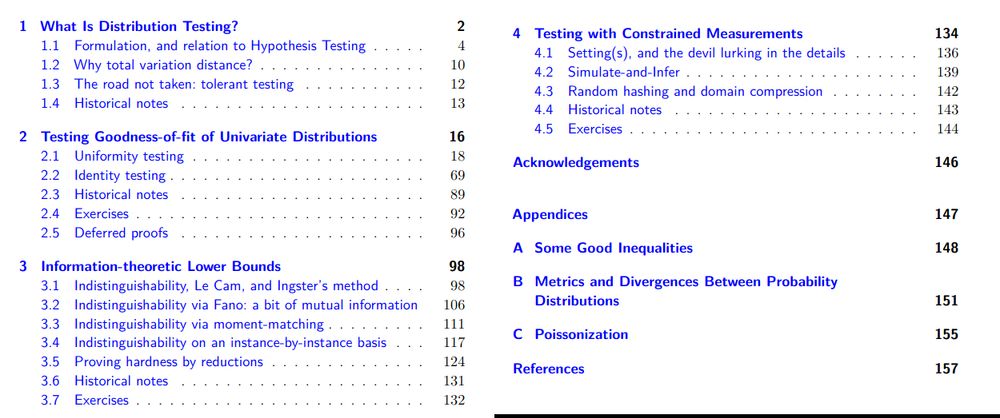
November 15, 2024 at 8:02 PM
Reminder/plug: my graduate-level monograph on "Topics and Techniques in Distribution Testing" (FnT Comm. and Inf Theory, 2022).
📖 ccanonne.github.io/survey-topic... [Latest draft+exercise solns, free]
📗 nowpublishers.com/article/Deta... [Official pub]
📝 github.com/ccanonne/sur... [LaTeX source]
📖 ccanonne.github.io/survey-topic... [Latest draft+exercise solns, free]
📗 nowpublishers.com/article/Deta... [Official pub]
📝 github.com/ccanonne/sur... [LaTeX source]
Reposted by Edward H. Kennedy
🔥🔥🔥 from Chris Adams's "Learning Microeconometrics with R:"

November 25, 2024 at 2:20 AM
🔥🔥🔥 from Chris Adams's "Learning Microeconometrics with R:"
"There’s no way you can just sit down & do a `big thing', or at least I can’t. So I just went back to doing lots of little things, & hoping that some of them will turn out okay. Statistics is a wonderfully forgiving field... all you have to do is get an idea & keep at it."
- Brad Efron #statsquotes
- Brad Efron #statsquotes
November 24, 2024 at 3:09 AM
"There’s no way you can just sit down & do a `big thing', or at least I can’t. So I just went back to doing lots of little things, & hoping that some of them will turn out okay. Statistics is a wonderfully forgiving field... all you have to do is get an idea & keep at it."
- Brad Efron #statsquotes
- Brad Efron #statsquotes
Reposted by Edward H. Kennedy
Kandiros, Pipis, Daskalakis, and Harshaw have a really Interesting new arxiv preprint on "conflict graph designs" for interference/spillovers: arxiv.org/abs/2411.10908 For GATE estimation the improvement is very significant and I'm optimistic/excited about how the ideas will impact the literature..!

November 22, 2024 at 1:51 PM
Kandiros, Pipis, Daskalakis, and Harshaw have a really Interesting new arxiv preprint on "conflict graph designs" for interference/spillovers: arxiv.org/abs/2411.10908 For GATE estimation the improvement is very significant and I'm optimistic/excited about how the ideas will impact the literature..!
Reposted by Edward H. Kennedy
The European Causal Inference Meeting 2025 is coming to Ghent! ✨ Share your work with experts across the globe – abstract submission for oral & poster presentations is now open! eurocim.org/abstracts.html
November 22, 2024 at 3:45 PM
The European Causal Inference Meeting 2025 is coming to Ghent! ✨ Share your work with experts across the globe – abstract submission for oral & poster presentations is now open! eurocim.org/abstracts.html
New paper! arxiv.org/pdf/2411.14285
Led by amazing postdoc Alex Levis: www.awlevis.com/about/
We show causal effects of new "soft" interventions are less sensitive to unmeasured confounding
& study which effects are *least* sensitive to confounding -> makes new connections to optimal transport
Led by amazing postdoc Alex Levis: www.awlevis.com/about/
We show causal effects of new "soft" interventions are less sensitive to unmeasured confounding
& study which effects are *least* sensitive to confounding -> makes new connections to optimal transport




November 22, 2024 at 4:39 AM
New paper! arxiv.org/pdf/2411.14285
Led by amazing postdoc Alex Levis: www.awlevis.com/about/
We show causal effects of new "soft" interventions are less sensitive to unmeasured confounding
& study which effects are *least* sensitive to confounding -> makes new connections to optimal transport
Led by amazing postdoc Alex Levis: www.awlevis.com/about/
We show causal effects of new "soft" interventions are less sensitive to unmeasured confounding
& study which effects are *least* sensitive to confounding -> makes new connections to optimal transport
Reposted by Edward H. Kennedy
As my first post on this platform, allow me to advertise the RL theory lecture notes I have been developing with Sasha Rakhlin: arxiv.org/abs/2312.16730
(shameless repost of my pinned tweet)
(shameless repost of my pinned tweet)

November 21, 2024 at 2:48 PM
As my first post on this platform, allow me to advertise the RL theory lecture notes I have been developing with Sasha Rakhlin: arxiv.org/abs/2312.16730
(shameless repost of my pinned tweet)
(shameless repost of my pinned tweet)
Reposted by Edward H. Kennedy
What’s the best way to structure a quantitative methods sequence? Our current take is roughly:
1) Probability/Inference/Regression
2) Causal Inference
3) Model based inference (MLE/Bayes)
4) Machine Learning
1) Probability/Inference/Regression
2) Causal Inference
3) Model based inference (MLE/Bayes)
4) Machine Learning
November 20, 2024 at 12:15 AM
What’s the best way to structure a quantitative methods sequence? Our current take is roughly:
1) Probability/Inference/Regression
2) Causal Inference
3) Model based inference (MLE/Bayes)
4) Machine Learning
1) Probability/Inference/Regression
2) Causal Inference
3) Model based inference (MLE/Bayes)
4) Machine Learning
In this paper we consider incremental effects of continuous exposures:
arxiv.org/abs/2409.11967
i.e., soft interventions on cts treatments like dose, duration, frequency
it turns out exponential tilts preserve all nice properties of incremental effects with binary trt (arxiv.org/abs/1704.00211)
arxiv.org/abs/2409.11967
i.e., soft interventions on cts treatments like dose, duration, frequency
it turns out exponential tilts preserve all nice properties of incremental effects with binary trt (arxiv.org/abs/1704.00211)




November 13, 2024 at 4:26 AM
In this paper we consider incremental effects of continuous exposures:
arxiv.org/abs/2409.11967
i.e., soft interventions on cts treatments like dose, duration, frequency
it turns out exponential tilts preserve all nice properties of incremental effects with binary trt (arxiv.org/abs/1704.00211)
arxiv.org/abs/2409.11967
i.e., soft interventions on cts treatments like dose, duration, frequency
it turns out exponential tilts preserve all nice properties of incremental effects with binary trt (arxiv.org/abs/1704.00211)
Reposted by Edward H. Kennedy
This work was led by Alex Levis - an amazingly talented postdoc, who I've been lucky to work with on a surprisingly wide variety of really interesting causal inference problems
www.awlevis.com/about/
www.awlevis.com/about/
October 12, 2023 at 3:05 AM
This work was led by Alex Levis - an amazingly talented postdoc, who I've been lucky to work with on a surprisingly wide variety of really interesting causal inference problems
www.awlevis.com/about/
www.awlevis.com/about/
Reposted by Edward H. Kennedy
This paper was so fun:
arxiv.org/pdf/2301.121...
We give new methods for estimating bounds on avg treatment effects - trt is confounded, but an instrument is available. Super common in practice
The bounds are non-smooth, so std efficiency theory isn't applicable
Lots of useful nuggets throughout!
arxiv.org/pdf/2301.121...
We give new methods for estimating bounds on avg treatment effects - trt is confounded, but an instrument is available. Super common in practice
The bounds are non-smooth, so std efficiency theory isn't applicable
Lots of useful nuggets throughout!




October 12, 2023 at 1:34 AM
This paper was so fun:
arxiv.org/pdf/2301.121...
We give new methods for estimating bounds on avg treatment effects - trt is confounded, but an instrument is available. Super common in practice
The bounds are non-smooth, so std efficiency theory isn't applicable
Lots of useful nuggets throughout!
arxiv.org/pdf/2301.121...
We give new methods for estimating bounds on avg treatment effects - trt is confounded, but an instrument is available. Super common in practice
The bounds are non-smooth, so std efficiency theory isn't applicable
Lots of useful nuggets throughout!
Very excited about this paper!
arxiv.org/abs/2305.04116
We study if one can improve popular semiparametric / doubly robust / DML causal effect estimators - w/o adding structural assumptions...
Short answer: nope!
Turns out these methods are minimax optimal here
www.ehkennedy.com/uploads/5/8/...
arxiv.org/abs/2305.04116
We study if one can improve popular semiparametric / doubly robust / DML causal effect estimators - w/o adding structural assumptions...
Short answer: nope!
Turns out these methods are minimax optimal here
www.ehkennedy.com/uploads/5/8/...




November 12, 2024 at 3:30 AM
Very excited about this paper!
arxiv.org/abs/2305.04116
We study if one can improve popular semiparametric / doubly robust / DML causal effect estimators - w/o adding structural assumptions...
Short answer: nope!
Turns out these methods are minimax optimal here
www.ehkennedy.com/uploads/5/8/...
arxiv.org/abs/2305.04116
We study if one can improve popular semiparametric / doubly robust / DML causal effect estimators - w/o adding structural assumptions...
Short answer: nope!
Turns out these methods are minimax optimal here
www.ehkennedy.com/uploads/5/8/...
Reposted by Edward H. Kennedy
Wow things seem to actually be taking off here…
November 12, 2024 at 2:41 AM
Wow things seem to actually be taking off here…



